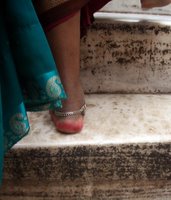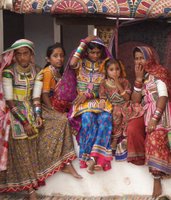
Women's Feature Service, March 27th 2006 (Titled "Gay, But Not Equal")
Skirted by mainstream media and general politics, discussion on homosexuality is not typical coffee-table talk in
The media has played a large role in lending legitimacy to the Indian gay rights movement. It is not uncommon to wake up on a Sunday morning to an interview with a prominent gay designer on the morning news, or to walk into a theatre and find a film featuring a gay character. Movies such as 'My Brother Nikhil', in which the life and death of an Indian gay man are sensitively portrayed, help build public empathy for the cause of the gay movement. The Canadian-British production 'A Touch of Pink' gracefully portrays the cultural challenges faced by an NRI gay man in his relationship with his partner. Humorous and moving, the film successfully drives home the point that two successful, affable men can be in a loving relationship.
Lesbians, in contrast, are less visible in mainstream media; when lesbian love is portrayed, it is often stereotyped and misrepresented. The homophobic film 'Girlfriend', for instance, both demonises lesbians - through its representation of the lesbian woman as an irrational, violent, jealous and dangerous lover - and offers lesbian lovemaking as erotica for men. By perpetuating this stereotype of lesbian relationships, the film underscores what the plethora of lesbian-porn films has indicated: lesbian relationships are perceived to be trivial, shallow and, most importantly, 'enhanced' objects of male desire.
Misrepresentations of lesbianism fuel misunderstandings and ignorance about lesbianism. "Nearly 60-70 per cent of the calls that we get on our hotline are from men," says Maya Shankar, coordinator of Sangini, a Delhi-based lesbian rights group. "Some are prank callers, and some call because they think it is a phone sex hotline." From research conducted on the calls received by the hotline, Sangini has gathered that much misperception about lesbianism can be attributed to male-centric attitudes. "Many men think that women become lesbian because they have been abused by men, or that lesbianism is just a phase that women will grow out of when they 'experience' a man. One young man called our hotline to ask us if he should have sex with his sister in order to 'cure' her of being a lesbian," she adds.
Indeed, patriarchy often lies at the heart of misunderstanding and non-acceptance of lesbian desire. In a largely patriarchal society such as
This is emotionally and psychologically taxing for lesbians, and has resulted in many adopting painful escape mechanisms: abandoning thoughts about their sexuality, running away from home, or even taking their lives. Despite the pressure, there are lesbian women who have been able to carve out spaces for themselves. "I've met several women from small towns who live together, and have been able to sensitise family and neighbours about their relationship. Some are even married to each other," says Kriti, coordinator of PRISM, a queer activist forum.
Yet, as sexual desire is largely perceived to be the prerogative of the male in our society, these instances are usually the exception rather than the rule. People are often uncomfortable with the prospect of a woman being open about her sexual desires, and even more so with women who express a preference contrary to what is assumed to be 'correct'. Tarun Khaitan of the Alternative Law Forum, a lawyers collective that uses law to address situations of marginalisation and disempowerment on the basis of sexuality, explains the double marginalisation of lesbian sexual desire as follows: "Patriarchy, in denying any sexual agency to women, makes it imperative for lesbians to first come out as sexual beings before they can articulate their alternative sexual orientation, thus making the task doubly difficult."
Even when lesbian women have come out of the closet, the search for a partner is not as easy as it is for gay men, largely due to constraints on social mobility that women face in the public sphere. Gay men in most Indian metros, like heterosexual men, can meet potential partners in cruising areas, at nightclubs, and even in parks and coffee shops. Women do not have this fluidity of movement - due to lack of safety in public spaces, lack of safe transportation, or due to family norms that regulate a woman's movement outside the home. "One of our group members had to give her parents a different excuse every week in order to attend our afternoon meetings. It is even harder for women to get out at night," says Shankar.
Financial dependence on the family also makes it difficult both for lesbian women to come out of the closet, and for the family to accept her choice. "It is hard for a lesbian woman who is financially dependent on her parents to reveal her sexuality, and refuse pressures such as marriage. Parents of the upper and middle classes are often not comfortable with the prospect of a girl taking up employment," says Shankar.
Entertainment establishments also 'penalise' women for this perceived dependence; restaurants that might cater to gay men are not necessarily lesbian-friendly. "There are very few restaurants or bars that organise 'lesbian nights' because owners believe that lesbian women don't have the money to spend at these places," says Archana, member of a queer activist group called Nigaah Media Collective. Even when spaces do exist, few lesbians attend. "Many so-called lesbian-friendly nightspots are not comfortable spaces for women as there are usually men who stand and stare," she adds.
Undoubtedly, the struggle of lesbian women against patriarchy is the struggle of all women against patriarchy. When our society begins to understand and accept that women of all sexual orientations have the right to live their lives the way they choose to, Indian lesbian women will have their day - and, one hopes, their night.
Contact Sangini's helpline at: 011-55676450, or email info@sanginii.org


